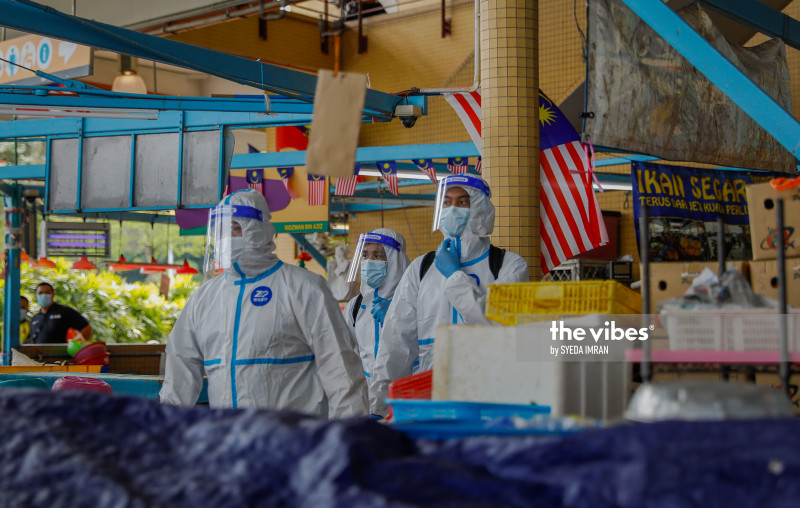
Published by The Vibes, Focus Malaysia & The Sun Daily, image from The Vibes.
WHILE the Covid-19 pandemic evidently threatens the nation through various aspects of life, mainly public health, the public is also called on to remain active regardless of the crisis by adopting a healthy lifestyle through proper diet and regular physical exercise.
This is because the World Health Organisation (WHO) claimed pre-crisis statistics had shown the vast majority of young people and adults were not active enough, and it could easily be assumed the situation could be even worse with the impact of Covid-19.
As to avoid other health complications besides the Covid-19 infection, the WHO urged people to stay active during the crisis and strongly emphasised the pandemic is not an excuse for people not to get enough exercise.
It is indeed the right indication that people should take care of their health during the crisis through proper healthy lifestyle practices to prevent the risk of producing another pandemic of ill-health as a result of their sedentary actions.
This is because the people’s failure in adopting a healthy lifestyle will directly lead to another health effect for them, such as the risk of cancer development and heart diseases that may even cause death.
Not just that, it is also likely to increase the country’s healthcare costs, in which healthcare funds are supposed to be allocated for our top priority in tackling the Covid-19 pandemic.
Currently, the conditional movement control order and the enhanced movement control order in several states to curb the Covid-19 spread will increase people’s difficulties to stay active due to the restriction measures that would indeed disrupt their ability to get sufficient physical exercise.
Still, people should not use it as an excuse not to maintain a physically active lifestyle during the crisis, where it can genuinely be done through indoor activities, outdoor activities and strength training based on the American College of Sports Medicine.
Since the government’s actions will influence the regular operation of particular places for physical activities, such as gyms and public areas, it would be nice if the government could actively introduce programmes to encourage people to maintain a healthy lifestyle as part of the new norm.
Plus, it is different from before because the rakyat could comfortably conduct physical activities due to the relaxation measures introduced by the government during the nationwide recovery movement control order.
In the ongoing battle against Covid-19, most people will possibly neglect healthy lifestyle practices because their worries will inevitably soar, mainly due to the alarming daily cases caused by the third wave of infection.
It can also be presumed that the third wave of Covid-19 infections will not only raise people’s fear of going out and doing physical activities, it will also contribute to the rakyat’s restrictions on consuming healthy food due to the price and availability of healthy food.
It is because the sudden rise of Covid-19 infections would also place a lot of pressure on urban dwellers about their source of income and job losses that will then affect their level of healthcare during the crisis, perhaps forcing them to skip physical exercises, eat less nutritious food and develop more stress or harm their mental health.
This is why, amid the Covid-19 crisis, people should remain active by following a healthy lifestyle because it will undoubtedly offer them more positive things, specifically the low risk of getting risky diseases besides Covid-19 infection.
It is also reasonably in line with the third quarter of EMIR Research Quarterly Poll that the National Worry Index scale bands have reached the maximum worry area of 0.79, which is just one notch below the unhealthy level of 0.80.
The NWI recorded during the third quarter of 2020 also highlights the high level of rakyat’s concerns about public health and economic impact of Covid-19 regardless of the third wave of Covid-19 infection.
Furthermore, it will give rise to the general expectation that the NWI for the fourth quarter of 2020 could be worse than the previous one due to the increase in people’s concerns during the third wave of Covid-19 infection, primarily regarding their source of income that could later affect other factors such as health problems in this case.
The latest report from the Khazanah Research Institute also proved the health status of an individual is closely linked to socio-economic status, where low-income individuals are more likely to live shorter lives and record poorer health outcomes compared to higher-income earners.
Since poor health was reported to be more prevalent among lower-income groups, this will require the country to recover rapidly from Covid-19 to prevent the significant impact of the pandemic on the country’s public health and the economy that will further affect them.
Plus, the government should also come up with an effective policy implementation to address the issues that could have a direct impact to the rakyat’s health and provide assistance to the low-income groups to prevent them from getting poor health conditions on an ongoing basis.
After all, our country will require the government’s efforts along with the cooperation between the rakyat to stay strong on flattening the Covid-19 curve and win against the pandemic, adding to our significant efforts to remain active to prevent another health issue in this regard.
Farhan Kamarulzaman is a research assistant at EMIR Research, an independent think tank focused on strategic policy recommendations based on rigorous research.

